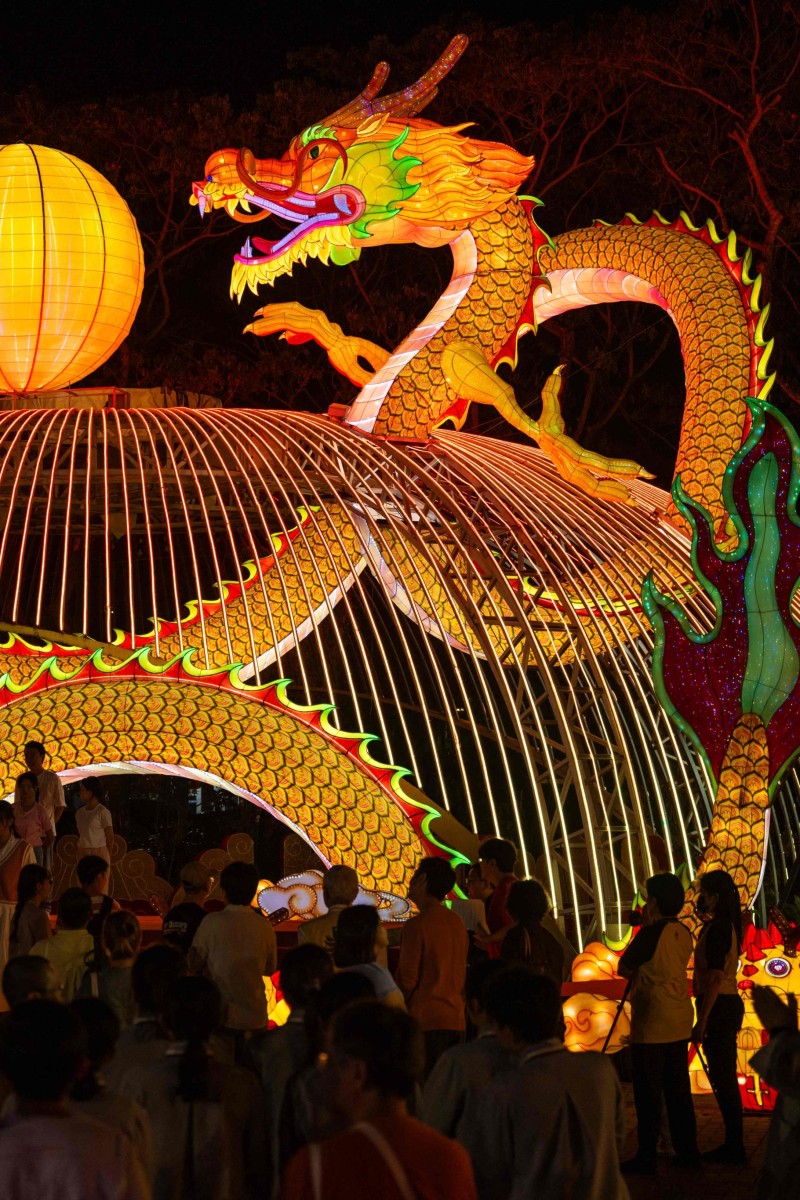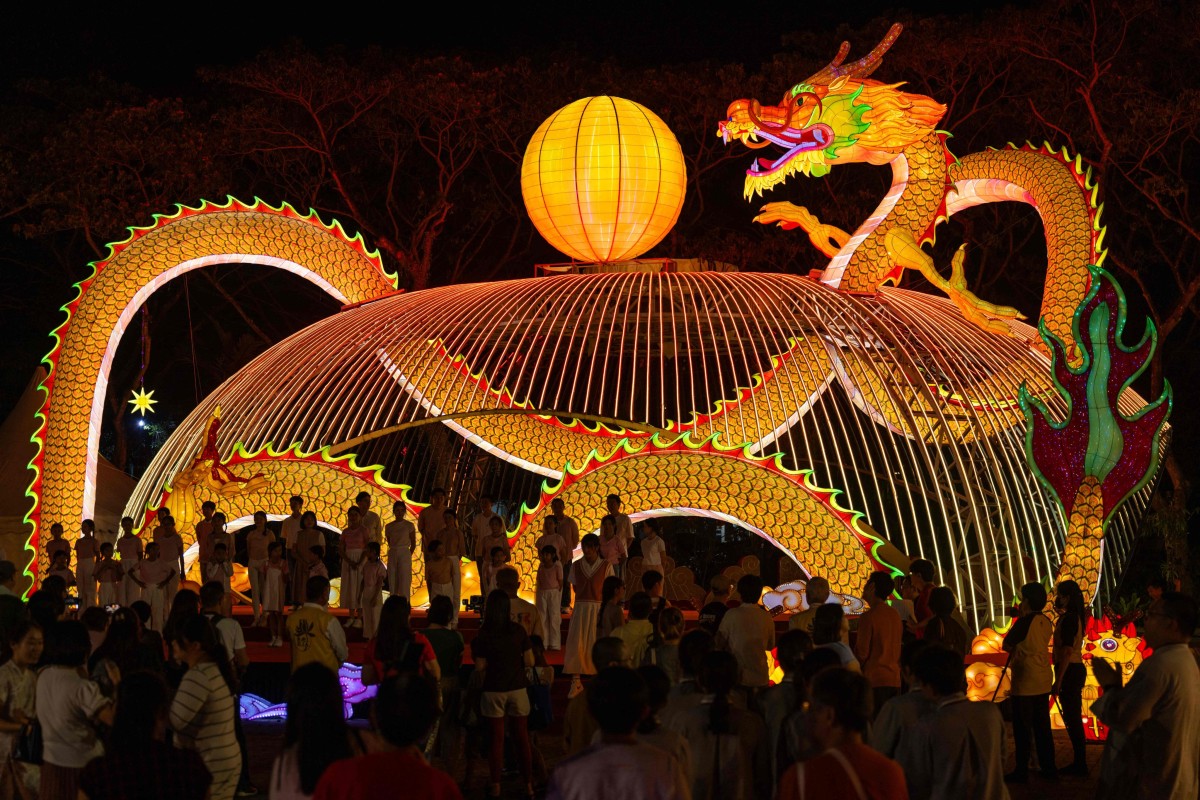
- The mythical creatures are revered in China as symbols of good fortune, power, harvest and prosperity
- Li Ka-shing, Bruce Lee and Christian Dior are some of the most well-known people born in this zodiac year
 People visit a dragon lantern decoration with energy-saving LED lights ahead of the Lunar New Year at the Fo Guang Shan Dong Zen temple southwest of Kuala Lumpur. Photo: AFP
People visit a dragon lantern decoration with energy-saving LED lights ahead of the Lunar New Year at the Fo Guang Shan Dong Zen temple southwest of Kuala Lumpur. Photo: AFPAfter bidding farewell to the Year of the Rabbit, we are set to kick off the Year of the Dragon. The dragon is the fifth animal in the Chinese zodiac, and it holds a unique position as the only mythical creature among the 12 zodiac signs. Dragons are also revered as a symbol of good fortune in Chinese culture.
Here’s what you need to know about Lunar New Year 2024, including the meaning and traits of dragons and important figures and events associated with this year.
What does the Year of the Wood Dragon mean?
In Chinese astrology, each zodiac sign is associated with one of the five elements: wood, fire, earth, metal and water. The combination of the animal sign and element determines the unique characteristics and energy of each year.
Representing growth and innovation, 2024 is the Year of the Wood Dragon. The wood element signifies stability, honesty, loyalty, creativity and growth, while the dragon symbolises power, good fortune, harvest and prosperity.
The Wood Dragon year is believed to cultivate progress and abundance, making it an ideal time to embark on new projects. This year is particularly favourable for innovative minds and problem solvers, as it offers stability in business operations and an energetic drive for creative ideas. Additionally, it presents a wonderful opportunity for individuals to pursue their dreams, express their ideas, and expand their horizons.
As dragons are known for their loyalty, the Year of the Wood Dragon also promotes harmony, generosity, honesty, and forgiveness within the workplace, family, and social environments.
What does the Year of the Dragon hold for you?
Traits of the dragon
Dragons are mythical creatures that have captivated humans for centuries, appearing in various cultures and folklore around the world. In Chinese culture, these creatures are seen as majestic and powerful, and emperors of ancient China often regarded themselves as the Dragon, the Son of Heaven.
Similarly, individuals born in the Year of the Dragon are said to possess remarkable qualities. They are often described as intelligent, charismatic, confident, and naturally lucky and gifted. They exude strong leadership abilities, although at times they can also be impulsive. They fearlessly embrace challenges and are willing to take risks in pursuit of their goals.
Once they set their goals, they will exert their utmost efforts to achieve success. They possess an additional gift – innate luck – which helps them along their journey. With their charm and allure, they can easily win the hearts of others.
Key events from Years of the Dragon past
Queen Elizabeth II’s Accession – 1952
The Year of the Dragon in 1952 marked a significant transition for the British monarchy. On February 6, 1952, their beloved King George VI passed away, and his daughter, Princess Elizabeth, ascended the throne, becoming Queen Elizabeth II. Her accession brought a new era to the British monarchy and initiated a reign that would span several decades until she passed away in 2022. In 2015, Queen Elizabeth II became the longest-reigning monarch in British history.
Tangshan Earthquake – 1976
While the Year of the Dragon is generally considered auspicious - or lucky - there are exceptions. The year 1976 was marred by a devastating earthquake in Tangshan, China. On July 28, a massive earthquake measuring 7.8 on the Richter scale struck the city, resulting in one of the deadliest natural disasters in history. The earthquake claimed the lives of approximately 242,000 people and caused widespread destruction. This tragic event left a lasting impact on the nation and is remembered as one of the most significant earthquakes of the 20th century.
The launch of the Shenzhou 9 Spacecraft – 2012
In the Year of the Dragon 2012, China achieved a major milestone in its space programme. The country successfully launched the Shenzhou-9 spacecraft, which carried a crew of three astronauts, including China’s first female astronaut. The mission marked a significant step forward in China’s space exploration efforts and highlighted the country’s ambitions to become a major player in space exploration.
The diversity of dragon culture around the world
Famous dragons
Li Ka-shing
Affectionately called “Superman,” Li Ka-shing is an influential figure in the business world. Born in the Year of the Dragon in 1928, he moved to Hong Kong from Chiuchow, Guangdong province in the 1940s, rising from humble beginnings and low-paying jobs to become one of the wealthiest individuals in Asia. Li is also actively involved in charity work, donating millions of dollars to support healthcare and education initiatives.
Bruce Lee
The martial arts legend was born in the Year of the Dragon in 1940. Although he grew up in San Francisco in the US, Bruce Lee’s Chinese heritage shaped his identity and influenced his journey. It was said that his Chinese stage name, Lee Siu-long - “little dragon” in Chinese - was inspired by the year he was born. Although he died young, there’s no doubt he revolutionised martial arts and brought it to Hollywood, leaving behind timeless films and an enduring legacy. His strength and wisdom serve as a perfect example of the dragon.
Christian Dior
Christian Dior was born in France in 1905. Despite his early interest in fashion, Dior’s design career began in the 1930s when he was hired as a fashion illustrator. After serving in the army during World War II, he established his own fashion house in 1946 and surprised the world with his inaugural collection, known as the “New Look,” the following year. Tragically, Dior passed away on October 24, 1957, at the young age of 52. However, his legacy continues, with his successors expanding the brand’s vision and influence in the fashion industry.